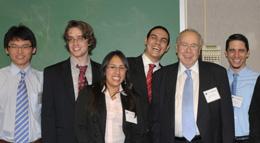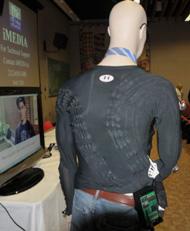
The prize-winning VISTA Wearable team with competition benefactor, Harvey Kaylie: from left, Lei Ai, Frank Palmer, Cindy Rodriguez, Daniel Zuleta, Mr. Kaylie and Javier Montesino.

Prototype Vista Wearable shirt showing embedded wires connecting sensors and vibration devices.

A vibrotactile pod prototype attached to an armband.
Team ‘VISTA Wearable’ Wins for Hands-Free System to Help Visually Impaired
A hands-free system to help visually impaired people sense their surroundings won $50,000 for a team of five City College of New York students in the Second Annual Kaylie Prize for Entrepreneurship competition.
The team, "VISTA Wearable," includes four senior computer engineering majors – Daniel Zuleta, Frank Palmer, Cindy Rodriguez, and Javier Montesino – and doctoral student in psychology, Lei Ai. Professor of Computer Science Zhigang Zhu advised the team.
A judging panel of industry professionals selected the winning team from among five finalists that made presentations at CCNY’s Grove School of Engineering May 3. This year, 25 teams entered the contest, which fosters engineering innovation and free enterprise among City College students and is supported by a gift from engineering alumnus Harvey Kaylie, ’60.
The prize will finance a summer of housing and support for the students while they work in the "InnoLab," a Silicon Valley garage-like workspace on The City College campus, to refine and bring their invention to market.
"None of these projects will fall through the cracks. All were very good," Professor Dan Steingart, the contest's organizer and faculty supervisor said, after he announced the winner. "We’re going to find ways to support them so they can continue their work."
The VISTA acronym stands for Vibro Tactile Intelligent System for Travelling Aid. During the team’s presentation, Mr. Zuleta explained that without visual cues or in a low-vision environment, one naturally navigates by touch, using the hands, a cane, or a guide animal’s signals. "We want to enhance this instinct,” he said, “while freeing the hands for other tasks."
Their system consists of ultrasonic sensors that detect the distance of nearby obstacles and vibrating devices that convey this information to the wearer with increasing vibration intensity (amplitude) as the object nears. These were stitched into an athletic shirt or housed in wireless "vibrotactile pods" worn on armbands or a harness. A video produced by the team showed visually impaired high school students learning to use the devices in as little as 30 seconds.
The team, "Julintani," won the Dean’s Prize of a summer of stipend support in the InnoLab to continue development of a cellphone micro-donation app for alumni. Created by undergraduates Johnny Huang and Crae Sosa, and graduate students Jeff LeBlanc, Franqueli Mendez and Elliot Schrock, the app would assist students while in college, with maps or social functions for example, then transform at graduation into an app to facilitate giving to their alma mater.
The three other finalist teams, their members and product ideas were:
NExT UI: Mohammod Arafat, John Ettikkalayil, Jaeseung Hahn and Ana Kodra. This team created a suite of eye-tracking software and devices that allow a user to manipulate items on a computer screen without a mouse or keyboard: EyeMap, EyeDraw, and EyeTracker. Professor of Biomedical Engineering Lucas Parra advised the team.
Cor Vitalis: Nathali Bertran, Mike Cinelli, Nigel Gebodh, Samuel Kupfer and Sara Morsi. This team developed an artificial heart and pumping mechanism that does not destroy blood cells. The heart and pump are made of a flexible silicon sack housed within a hard biopolymer shell with an attached lightweight saline pump. Professor of Biomedical Engineering John Tarbell advised the team.
Nanofils: Howie Chu, Francisco Guzman, Rahul Jayamohanlathika, Alex Skuratovsky and Muhammed Uzair. This team developed a low-cost, long-lasting water filtration system that uses a novel nanoparticle to clear water of particulates, toxins, oils and organisms. The silver-nylon filter material withstands high temperatures, allowing the filter to be sterilized with steam. Professor of Chemical Engineering Alex Couzis advised the team.
Mr. Kaylie, an entrepreneur who endowed the competition through a $3 million gift in 2010, explained prior to the presentations that his intent for the competition is to recreate an engineering business environment for students "to learn about the real world where there is success and failure."
Unlike similar competitions, entrants not only designed and built their inventions, but also filed paperwork and prepared business plans as if pitching to investors. "One of the great things about CCNY is you get an education, but it’s not handed to you on a silver platter, you have to work at it," added Mr. Kaylie, who is president and founder of Mini-Circuits, a Brooklyn-based RF and microwave electronic components design, manufacture and distribution company.
The panel of judges consisted of: Mr. Kaylie; Elizabeth Fastiggi, an entrepreneur and private equity investor; Sergey Nazarov, founder and general partner of QED Capital; Jon Santiago, co-founder and director of THINK; Katherine Snyder, editor, Bloomberg News; and David Tannenbaum, chief operating officer of ThinkNear.
MEDIA CONTACT
Jessa Netting
p: 212.650.5310